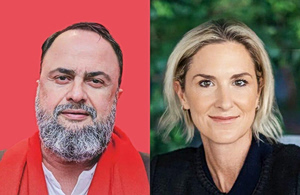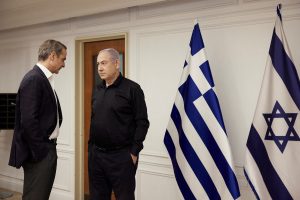TEHRAN—Iranians have few ways to express themselves when elections come around. This year’s parliamentary ballot has seen a mass disqualification of candidates, narrowing the political field more than ever after authorities crushed nationwide protests in late 2022.
So instead of voting, a record number of people are expected to boycott Friday’s parliamentary election to register their disapproval.
This is a problem for the country’s Supreme Leader Ali Khamenei . Though the poll is expected to strengthen his hard-liners’ control of the 290-member chamber, a high turnout is important for Khamenei and his clerical rule, which has historically used it to enhance its legitimacy.
Iranians have increasingly shunned the ballot box in recent years. Turnout for the parliamentary elections was just over 42% in 2020, and 48% for the 2021 presidential vote. This time, about 38% of Iranians plan to vote, according to a poll this week by the Iranian Students Polling Agency. Even the state-run Islamic Republic of Iran Broadcasting in a poll this week predicted participation of 40%.
Friday’s turnout is set to be the lowest in an election since the 1979 revolution. It’s driven partly by economic hardship, apathy over the lack of political change and the government’s violent crackdown on protests, including on a monthslong wave of unrest that erupted in 2022 when a 22-year-old woman, Mahsa Amini , died in police custody after she was arrested for allegedly violating the country’s strict Islamic dress code.
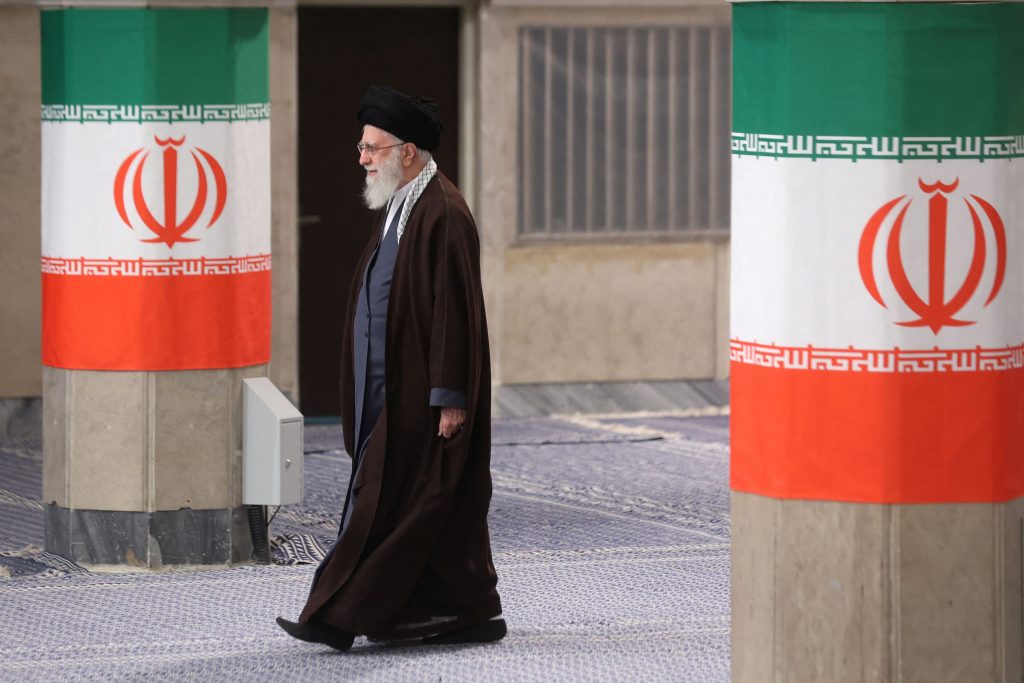
Iran’s Supreme Leader Ayatollah Ali Khamenei arrives to cast his vote during parliamentary elections in Tehran, Iran, March 1, 2024. Majid Asgaripour/WANA (West Asia News Agency) via REUTERS ATTENTION EDITORS – THIS PICTURE WAS PROVIDED BY A THIRD PARTY.
Demands for greater freedom quickly morphed into calls for the overthrow of the Islamic Republic in one of the biggest challenges to the clerical leadership since the founding of the Republic more than four decades ago. The government’s response was brutal . Thousands were detained, hundreds were killed and several citizens jailed during the protests were sentenced to death.
“Participating in any election after what happened last year, and everything we are going through, would be to make a fool of myself,” said a 40-year-old artist in Tehran.
A weak economy, hurt by international sanctions and worsening regional tensions stemming from Israel’s war with Hamas in Gaza, is compounding the government’s problems. With the mood souring, Khamenei this week stressed that casting a vote was in the nation’s interest—an indication of the stakes involved for the leadership.
“Elections in the Islamic Republic shouldn’t be taken lightly,” he said on X Wednesday. Before the 1979 Islamic Revolution, he said, the Shah’s rule had been “a period of absolute dictatorship.”
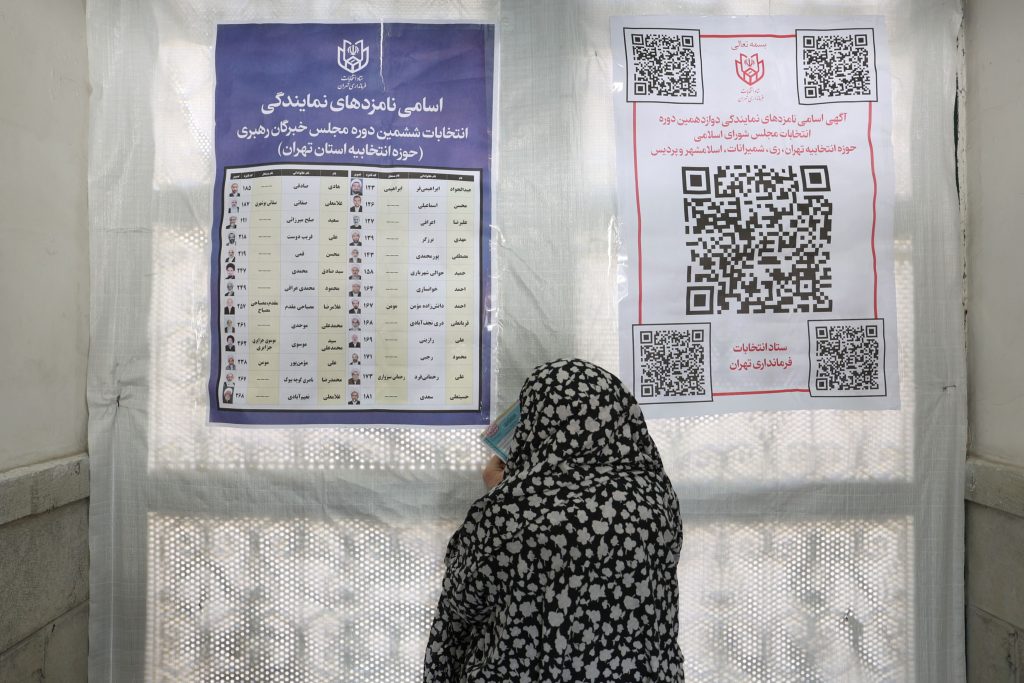
An Iranian woman checks the names of candidates during parliamentary elections at a polling station in Tehran, Iran, March 1, 2024. Majid Asgaripour/WANA (West Asia News Agency) via REUTERS ATTENTION EDITORS – THIS PICTURE WAS PROVIDED BY A THIRD PARTY.
Many Iranians take issue with how the government for decades has propped up regional militias, including Hamas and the Houthi rebels in Yemen , at the expense of their own economic well-being. Discontent continues to simmer despite the crackdown on the protests, and the grievances that triggered them haven’t abated.
Others dismiss the idea that they can effect change through the ballot box.
“There is no way the sitting members of parliament can have a positive effect on our lives,” a university professor said. “This accumulated anger and dissatisfaction in people will be manifested this time through the small number of voters in the elections.”
To be sure, Friday’s election is far from pivotal. Iran’s parliament has the power to exercise oversight over the government, though absolute authority rests with the supreme leader, Khamenei. Yet the outcome has the potential to embarrass the establishment.
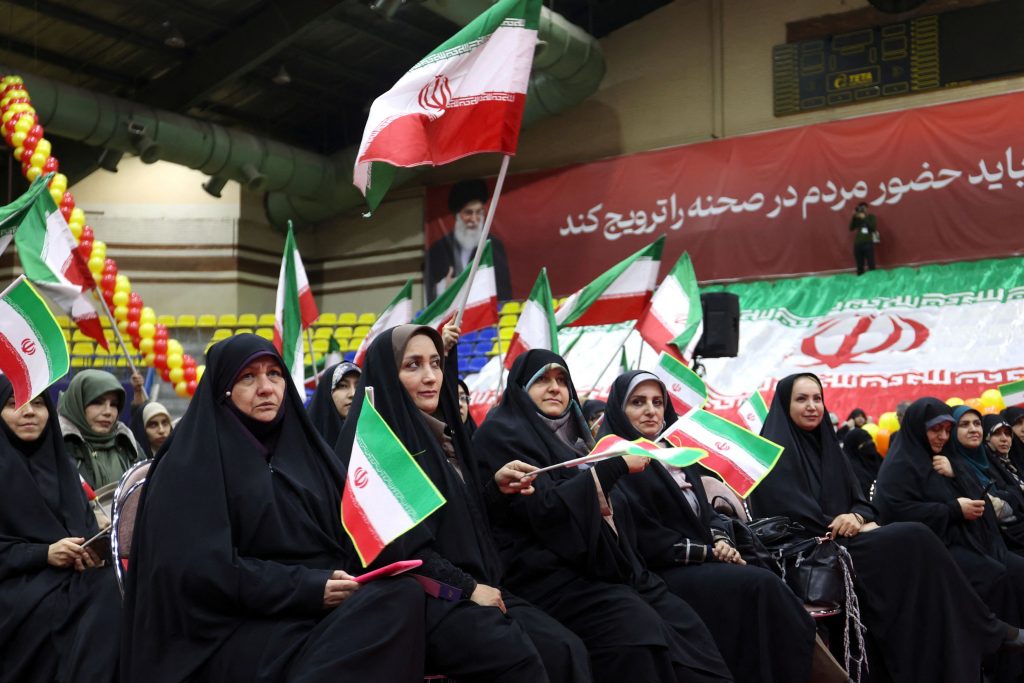
People attend a campaign for the parliamentary election in Tehran, Iran, February 27, 2024. Majid Asgaripour/WANA (West Asia News Agency) via REUTERS ATTENTION EDITORS – THIS PICTURE WAS PROVIDED BY A THIRD PARTY.
Political groups, including a 31-party reformist coalition and a reformist clerical association in the holy city of Qom, have called for a boycott of the election after a vast majority of reformists were disqualified from running, as were many centrist conservatives, including dozens of incumbent lawmakers. More than 15,000 candidates are competing for a four-year term in parliament, according to state media.
Iranians are also voting for members of the Assembly of Experts, a deliberative body of 88 senior clerics—a conclave of sorts—tasked with selecting the next supreme leader.
Khamenei, who is 84, has vast influence over who can run.
Candidates for the Assembly of Experts are vetted by six clerics directly appointed by Khamenei. Those six clerics, alongside six legal scholars pre-vetted by the head of the judiciary—who in turn is also appointed by Khamenei—approve candidates for parliamentary and presidential elections.
Even former President Hassan Rouhani , a political moderate and veteran of the country’s security establishment, had his candidacy for the Assembly of Experts rejected. He said his rejection was “politically motivated by a ruling minority.” Two former ministers of intelligence, Mahmoud Alavi and Heydar Moslehi, were also barred from running for the assembly.
The current president, Ebrahim Raisi , a hard-liner with close ties to Khamenei , is on the ballot sheet for the assembly.
Write to Sune Engel Rasmussen at sune.rasmussen@wsj.com

